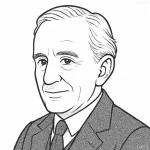“The atom bombs are piling up in the factories, the police are prowling through the cities, the lies are streaming from the loudspeakers, but the earth is still going round the sun.”

- June 25, 1903 – January 21, 1950
- Born in India during the British colonial period
- Author, journalist
table of contents
Quote
“The atom bombs are piling up in the factories, the police are prowling through the cities, the lies are streaming from the loudspeakers, but the earth is still going round the sun.”
Explanation
In this quote, George Orwell juxtaposes the chaotic and oppressive realities of human-made destruction and control with the indifference of nature. The mention of atom bombs, police surveillance, and propaganda reflects Orwell’s deep concerns about the rise of totalitarianism, militarization, and dehumanizing systems in the modern world. These elements represent the darkest aspects of human society—where technology and power are used for control, violence, and manipulation. However, Orwell’s statement that “the earth is still going round the sun” serves as a reminder that despite humanity’s efforts to shape the world through destruction and lies, the natural world remains indifferent and unchanged by human folly.
Orwell was acutely aware of the dangers of nuclear weapons and state repression, having witnessed the rise of authoritarian regimes and the use of atomic bombs during and after World War II. His works like 1984 and Animal Farm depict societies where governments manipulate truth, control their populations through force and surveillance, and justify destructive policies under the guise of national interest or ideology. Yet, in this quote, Orwell subtly points out that nature—the world we ultimately depend on—remains unmoved by our political conflicts and destructive tendencies. This serves as a kind of ironic comfort; no matter how dire or self-destructive human actions may become, the universe continues its course, unaffected by human ambitions or conflicts.
This idea is still highly relevant today, especially in light of ongoing issues such as nuclear proliferation, surveillance states, and the spread of misinformation. While the systems of power and control that Orwell critiques may still be in place, the natural world continues, indifferent to the damage that may be inflicted upon it. The quote underscores the transience of human-made crises compared to the steadfastness of the natural world, suggesting that humanity’s capacity for destruction, while significant, is ultimately small in the grand scheme of the universe. It calls for humility in our actions and a reminder that despite the chaos we create, we are not the ultimate force of nature.
Would you like to share your impressions or related stories about this quote in the comments section?

